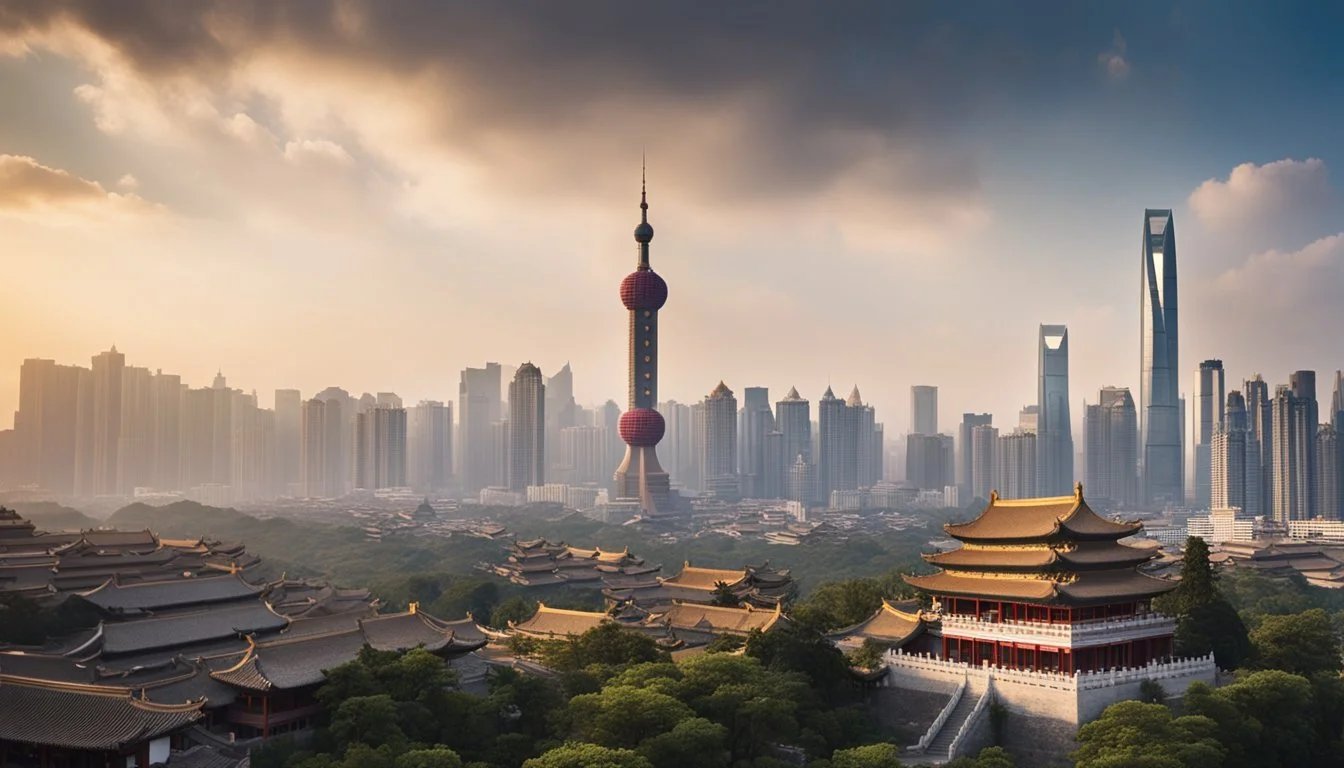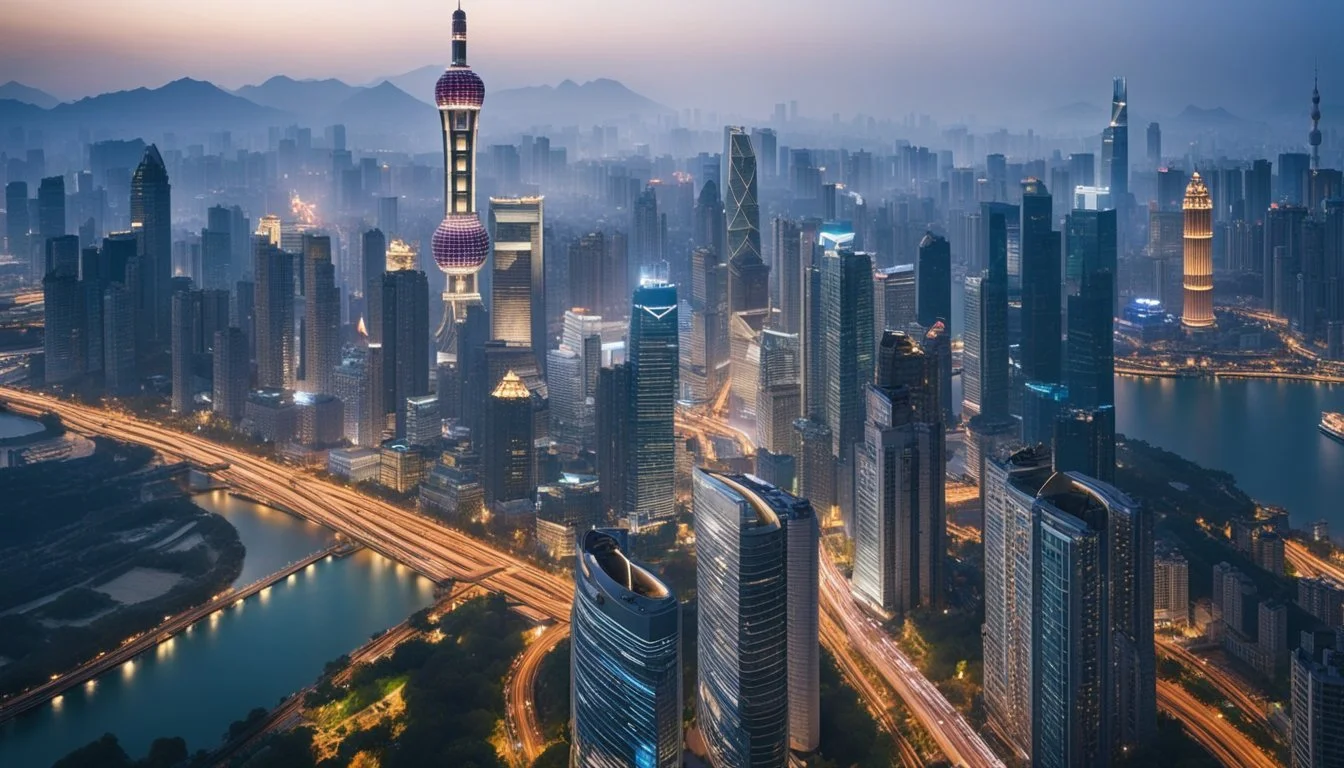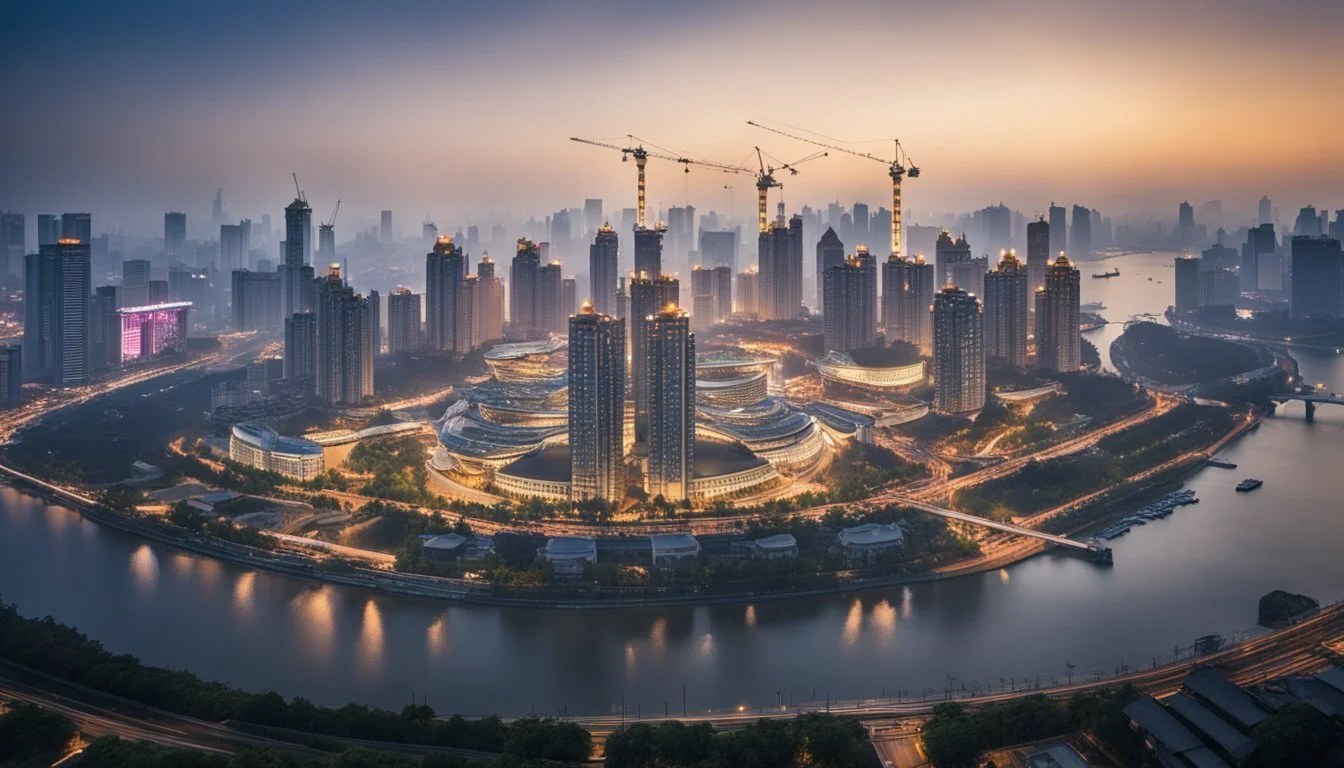Yung Chang: Documenting China's Rapid Transformation Through Film
Yung Chang, a multi-award-winning filmmaker, has made significant contributions to the documentation of China's rapid transformation through his compelling documentaries. His films offer an intimate glimpse into the lives of individuals and communities affected by China's fast-paced industrial growth and societal changes. Through works like Up the Yangtze and China Heavyweight, Chang has become a distinguished storyteller who captures the complexities and emotions behind the nation's modernization.
In Up the Yangtze (2007), Chang delves into the impact of the Three Gorges Dam project, showcasing the profound changes in the lives of those living along the Yangtze River. This documentary highlights the dislocation and adaptation brought about by one of the world's most ambitious engineering feats. China Heavyweight (2012) shifts the focus to rural China's longing for success in the ring, shedding light on personal aspirations against the backdrop of national change.
Wuhan Wuhan (2021), another notable work, documents the early days of the COVID-19 pandemic in Wuhan. The film offers a raw, on-the-ground perspective of a city under lockdown, reflecting the resilience and humanity amidst crisis. Yung Chang's films not only inform but also resonate deeply, making the broader narrative of China's transformation accessible and relatable to a global audience.
Yung Chang – The Filmmaker's Background
Yung Chang is a Canadian filmmaker, born in Canada to Chinese parents. He is known for his compelling approach to documentary filmmaking. His work often explores themes related to cultural identity, social change, and human resilience.
Chang rose to prominence with his debut feature documentary, Up the Yangtze (2007). This film examines the effects of the Three Gorges Dam project on families living along the Yangtze River. It received international acclaim and numerous awards.
His subsequent works include China Heavyweight (2012), which delves into the world of boxing in China, and The Fruit Hunters (2013), an exploration of the biodiversity and culture surrounding fruit. These films further solidified his reputation as a keen observer of societal changes in China.
Chang often collaborates with international teams, which enriches his perspective and broadens the reach of his work. His fourth documentary, This is Not a Movie (2019), follows the career of war correspondent Robert Fisk and highlights his uncompromising approach to journalism.
Filmography Highlights
Up the Yangtze (2007)
China Heavyweight (2012)
The Fruit Hunters (2013)
This is Not a Movie (2019)
Wuhan Wuhan (2021)
In 2021, he released Wuhan Wuhan, an intimate portrayal of life during the early days of the COVID-19 pandemic in Wuhan. This film offers a humanized view of the crisis, going beyond mere statistics and headlines.
Overview of China's Rapid Transformation
China's rapid economic growth since the late 20th century has been among the most significant developments in global history. Between 1978 and 2004, the country's real GDP per capita grew at an impressive rate, markedly transforming its economic landscape.
Key Drivers:
Economic Reforms: Initiated in 1978, the open-door policy and reforms significantly shifted China from a planned economy to a market-oriented one.
Industrialization: Heavy investment in manufacturing sectors propelled China to become the "world's factory."
Technological Advancements: Recent decades have seen China’s dramatic shift towards high-tech industries, driven by strategic state policies.
Impact:
Urbanization: Massive rural-to-urban migration has redefined China's demographic and socio-economic structures.
Standard of Living: Increased income levels have improved the average standard of living, although disparities remain.
Global Influence: China's role in global trade and economics has expanded, making it a central player on the world stage.
Challenges:
Sustainability: Environmental degradation and resource depletion present significant hurdles.
Inequality: Economic growth has resulted in inequality, both regionally and within urban-rural divides.
China's transformation is a complex interplay of policies, innovation, and global integration. The journey from an agrarian society to an economic powerhouse underscores its adaptive and resilient nature.
Documentary Works by Yung Chang
Yung Chang's documentaries provide a profound insight into China's rapid change and its effects on society. His works are characterized by their in-depth exploration of how personal stories intersect with broader social transformations.
Up the Yangtze – Exploring Social Impact
Up the Yangtze (2007) captures the lives of Chinese individuals affected by the construction of the Three Gorges Dam. This towering infrastructure project caused massive environmental and social upheaval. The film follows two teenagers who work on a cruise ship along the Yangtze River, revealing how modernization displaces communities. Chang's storytelling juxtaposes the traditional lifestyle with the relentless advance of progress, highlighting the human cost of economic development.
China Heavyweight – Boxing and Transformation
In China Heavyweight (2012), Chang turns his lens to rural China, where boxing becomes a metaphor for personal ambition and societal change. The film tracks the lives of two young boxers and their coach, presenting their struggles and aspirations. Through their journey, the documentary delves into themes of discipline, perseverance, and the search for a better life. The sport of boxing serves as a powerful symbol of the fight against socio-economic barriers.
The Fruit Hunters – Globalization of Tastes
The Fruit Hunters (2013) explores the world of exotic fruits and their cultural significance. This documentary goes beyond mere culinary curiosity by tracing the historical and economic routes that bring these fruits to global markets. Chang examines how tastes have been shaped by globalization and the passion of individuals who seek out rare fruits. The film reflects on biodiversity and the cultural connections forged through the world’s tastes, portraying the impacts of global trade on local traditions.
Cinematic Techniques and Narratives
Yung Chang's documentary approach is a balanced blend of stylistic choices and compelling storytelling.
He often employs slow pacing to let the viewer absorb the gravity of the situations. For instance, in Up the Yangtze, the lingering shots of the Yangtze River set a contemplative mood.
Close-ups are another favored technique. These shots capture intimate emotions, humanizing the subjects in a way that broadens the narrative's impact.
Chang’s narratives dive deeply into social themes. His films often juxtapose personal stories with broader socio-economic issues. For example, the story of families affected by the Three Gorges Dam in Up the Yangtze underscores the human cost of modernization.
He uses contrast effectively, portraying the clash between traditional Chinese lifestyles and rapid industrial progress. This can be seen in China Heavyweight, where the aspirations of young boxers are set against the backdrop of rural life.
Music and sound design in Chang’s works serve as both mood setters and narrative aids. The scores often underscore the emotional weight of scenes, enhancing the viewer's engagement.
His editing choices also deserve mention. Chang meticulously edits his documentaries, ensuring that each scene flows naturally while maintaining narrative coherence. This is evident in how he condensed 300 hours of footage for Wuhan Wuhan, resulting in a powerful yet concise narrative.
Chang’s storytelling doesn't shy away from showing contradictions. In The Fruit Hunters, he highlights the paradox of technology and tradition in agricultural practices, offering viewers a rich, layered story.
His cinematic techniques and narratives are both thought-provoking and emotionally resonant, allowing his documentaries to serve as poignant commentaries on China's rapid transformation.
Themes and Motifs in Chang's Documentaries
Yung Chang's documentaries explore a broad spectrum of topics, often focusing on the intersection of rapid modernization and cultural heritage.
Transformation and Displacement
In "Up the Yangtze," the transformation of the landscape due to the Three Gorges Dam project highlights the displacement of communities. The project symbolizes progress, but it also brings loss and upheaval for those living along the river.
Human Resilience
"China Heavyweight" examines the lives of aspiring boxers in rural China. The film underscores themes of resilience and aspiration as these young athletes strive for success, balancing traditional values against modern desires.
Cultural Heritage
Chang's films often draw on his cultural background, as seen in "Earth to Mouth." This film looks at the efforts to preserve cultural traditions amidst the pressures of economic change.
Contrasts of Modernity
"Wuhan Wuhan" portrays life during the lockdown, capturing the contrasting facets of modern urban life and traditional customs. This documentary underscores both community solidarity and individual struggles.
Film Themes Up the Yangtze Transformation, Displacement, Economic Change China Heavyweight Resilience, Aspiration, Tradition vs Modernity Earth to Mouth Cultural Heritage, Preservation Wuhan Wuhan Urban Life, Community Solidarity, Modern Struggles
Chang's use of personal stories within these broader themes allows viewers to connect deeply with the subjects' experiences. These motifs are consistent across his works, offering insights into the human side of China's rapid transformations.
Impact on Global Perceptions of China
Yung Chang's documentaries have significantly influenced global perceptions of China. His films capture the rapid changes in Chinese society, offering viewers an inside look that challenges monolithic views.
Up the Yangtze (2007) exposed audiences to the lives of those affected by the Three Gorges Dam. This project highlighted human stories and environmental impacts.
China Heavyweight (2012) provided a glimpse into the aspirations and struggles of young Chinese boxers. This documentary portrayed a dynamic, evolving youth culture in China.
Wuhan Wuhan (2021) depicted life in Wuhan during the early days of the COVID-19 pandemic. This film shaped international understanding of the human side of the crisis in China.
Chang's work often contrasts government narratives, providing a more nuanced view of China's ambitions and challenges. Through personal stories, he brings a human element to broader socio-political discussions.
By making these films accessible, Chang has contributed to a more balanced global dialogue about China. His ability to document diverse perspectives offers a comprehensive picture of a rapidly changing nation.
Critical Reception and Awards
Yung Chang's documentaries have garnered significant attention and praise. His debut, Up the Yangtze (2007), received acclaim for its thoughtful exploration of the Three Gorges Dam's impact on local communities. It won awards at various festivals, including the Golden Gate Award at the San Francisco International Film Festival.
China Heavyweight (2012) also saw critical success. The film was praised for its intimate portrayal of young boxers in China. It was nominated for Best Documentary at the 2013 Asia Pacific Screen Awards. The film also won the Grand Jury Prize at the Los Angeles Asian Pacific Film Festival.
In 2013, The Fruit Hunters demonstrated Chang's versatility. This film, a collaboration with the National Film Board of Canada, delved into the world of exotic fruits. It earned a nomination for Best Feature Length Documentary at the Canadian Screen Awards.
Chang's film Gatekeeper (2016) continued his tradition of impactful storytelling. It was recognized at Hot Docs Canadian International Documentary Festival, where it received the Best Mid-Length Documentary Award.
His 2021 documentary Wuhan Wuhan explored the early days of the COVID-19 pandemic. The film was well-received for its humane and candid look at the crisis's personal impacts. It was screened at several reputable festivals, including Hot Docs and Full Frame Documentary Film Festival.
Chang's work has also been acknowledged by significant institutions like the Sundance Institute, where he was a Fellow in 2015. This prestigious recognition underscores his influence and excellence in the documentary filmmaking community.
Yung Chang's Influence on Documentary Filmmaking
Yung Chang has significantly impacted documentary filmmaking, particularly in how he captures the rapid transformation of China.
His debut film, Up the Yangtze (2007), showcases the socio-economic effects of the Three Gorges Dam project. This film employs a narrative that intertwines personal stories with broader social changes.
In China Heavyweight (2012), Chang explores rural China's engagement with Western sports culture through the lens of boxing. His method of following the subjects' journeys provides an intimate look at their lives while highlighting cultural shifts.
Chang's The Fruit Hunters (2013) delves into the world of exotic fruits, seamlessly blending historical context with personal narratives. This film exemplifies his ability to weave diverse stories into a coherent theme.
His later work, This is Not a Movie (2019), presents a more political angle. By following journalist Robert Fisk, Chang delves into the complexities of war reporting. This documentary demonstrates his flexibility in tackling various subjects while maintaining a strong narrative.
In Wuhan Wuhan (2021), Chang captures the early days of the COVID-19 pandemic in Wuhan. This film stands out for its timely relevance and deep human empathy, offering a ground-level view of the crisis.
Chang's storytelling techniques exhibit a commitment to the personal narratives and cultural contexts that shape larger social and economic transformations. His work consistently blends the micro with the macro, offering a nuanced perspective on China's rapid evolution.
Collaborations and Influences
Yung Chang has worked extensively with a variety of collaborators throughout his career. His partnerships with producers, editors, and cinematographers have significantly shaped his body of work. Notable collaborators include:
Producers: His long-time producer, Ina Fichman, has been instrumental in bringing his visions to life.
Editors: Chang has worked with skilled editors like Mike Munn, whose editing style complements Chang’s narrative techniques.
His films are often influenced by contemporary issues and personal stories. For instance, Wuhan Wuhan was inspired by the early experiences of the COVID-19 pandemic. The documentary stands out due to its extensive footage and diverse perspectives.
Chang's collaborations with local communities and individuals are equally pivotal. In China Heavyweight, he engaged deeply with Chinese boxing culture, working closely with local athletes and coaches to portray authentic stories.
Chang's influences are diverse, ranging from renowned documentary filmmakers to personal experiences within China. Directors like Werner Herzog and Albert Maysles have shaped his approach to storytelling, focusing on the intricacies of human life and society.
Influential Films and Documentaries
The following table highlights some of Chang’s influential works and their impact:
Film Year Notable Elements Up the Yangtze 2007 Explores the impact of the Three Gorges Dam China Heavyweight 2012 Focuses on young boxers in rural China The Fruit Hunters 2013 Examines cultural and historical significance of fruit This is Not a Movie 2019 Chronicles the life of journalist Robert Fisk Wuhan Wuhan 2021 Documents early COVID-19 experiences in Wuhan
These collaborations and influences have profoundly shaped Yung Chang’s documentaries, contributing to his reputation as a distinguished filmmaker documenting China's rapid transformation.
Public and Academic Discussions
Yung Chang's work has sparked significant interest and dialogue among the public and academic communities. His documentaries provide a window into China's societal shifts, often spurring debates and analyses.
Public Reception:
Chang's films, such as Up the Yangtze and Wuhan Wuhan, have received critical acclaim.
Audience engagement through social media and public screenings highlight the impact of his storytelling.
Awards and nominations underscore the public's appreciation.
Academic Perspectives:
Researchers and scholars have delved into his films to explore various themes:
Urbanization: Films like China Heavyweight examine the rural-urban divide and socio-economic changes.
Health and Society: Wuhan Wuhan offers a human perspective on the COVID-19 pandemic, serving as a case study for public health discussions.
Cultural Identity: The Fruit Hunters and This is Not a Movie are often cited in studies on global and cultural narratives.
Forums and Conferences:
Chang's documentaries are frequently screened at international film festivals, including TIFF and Sundance, fostering academic dialogue.
Panel discussions and Q&A sessions following these screenings allow for deeper exploration of the themes presented.
Publications and Reviews:
Numerous articles and reviews in academic journals and mainstream media highlight the impact of his work.
These publications often dissect the narrative techniques and societal implications of his films.
Engagement with Chang’s documentaries continues to grow, reflecting their relevance and depth in capturing China's rapid transformation.
Future Projects and Directions
Yung Chang continues to explore new territories in his filmmaking journey. He remains interested in documenting stories that highlight both personal and social transformations. By probing into uncharted areas of human experience and societal change, Chang seeks to bring fresh perspectives to the screen.
Chang has hinted at upcoming projects that focus on environmental issues and their impact on communities. These documentaries may examine the intersections of economic development and ecological sustainability in sensitive regions.
Potential Areas of Focus:
Environmental sustainability
Technological advancements
Social justice
Chang is also reportedly interested in revisiting themes from his previous works. Leveraging his expertise, he aims to offer new insights by contrasting past and present scenarios. This approach would allow audiences to appreciate the evolving cultural and socio-economic landscapes.
Possible Revisits:
Revisiting the Yangtze River (post "Up the Yangtze")
Follow-up on Chinese athletes (post "China Heavyweight")
Hold the multi-award-winning director in anticipation as he navigates through these exciting future projects, continuing to contribute significantly to documentary filmmaking.







